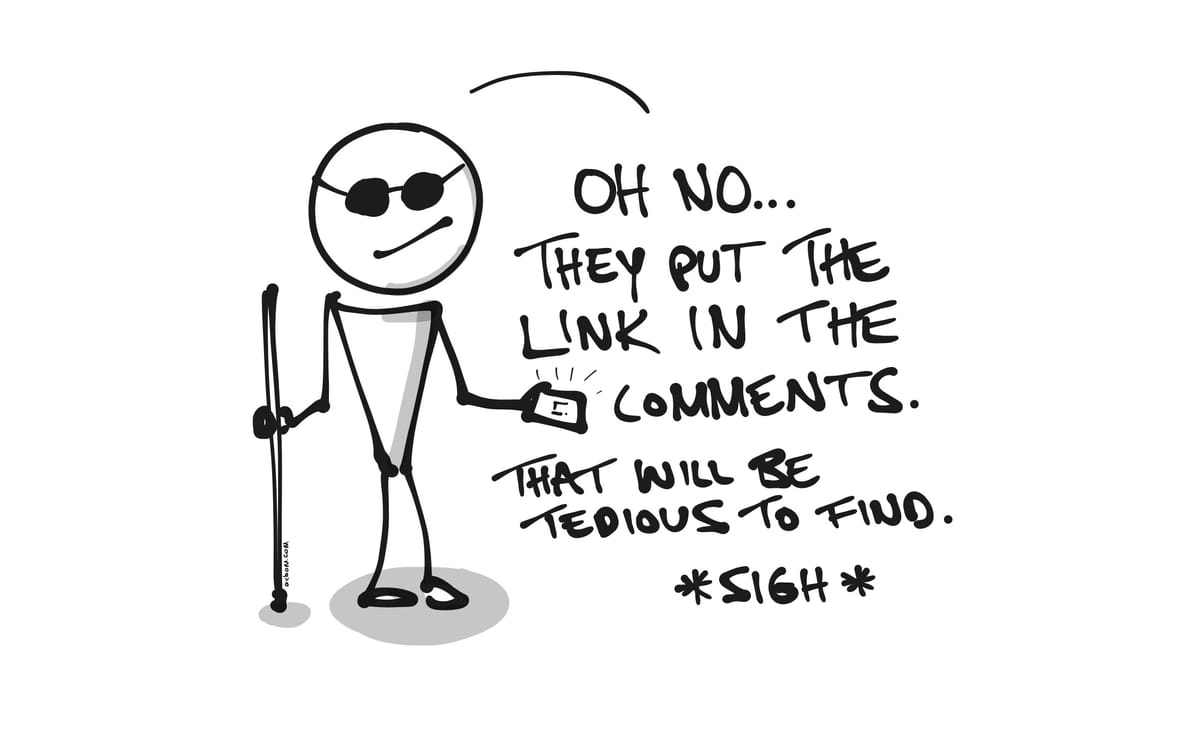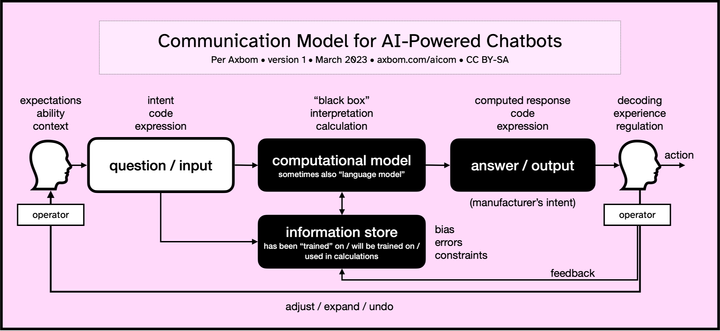Why ”link in comments” is a bad idea for LinkedIn accessibility
When humans adapt to technology they add obstacles to access content.

For years, people have been getting and heeding the advice of adding links to comments on LinkedIn, rather than including them in the main post. The supposed reasoning is that LinkedIn penalizes external links and your post will receive less views if it has links to content outside the LinkedIn platform. I explain why this widespread behavior bothers me so much.
When you publish a post on LinkedIn and then say ”the link is in the comments” you are making life harder for people.
- People with visual impairments will have to hunt for it through several comments as they’re often not able to quickly determine which comment actually contains a link (as, you know, they can’t easily see it).
- People with impaired cognitive abilities (persistent or temporary) may struggle to understand that they now need to seek out a link instead of seeing it immediately - and how to find it or ask for it.
- People with weakened motor skills may have to navigate several hard-to-tap areas to find what you are promising to share.
- And of course, it’s obviously harder for all readers to hunt for the link than it is to find the link in the very place where you wrote ”the link is in the comments”.
I understand that this behavior started because Hootsuite (and maybe a few others) did a study a few years back and determined that it was harder to get posts to go ”viral” if they had external links in the main body of a post.
Are you confident this even still applies? Are you confident that it truly applies to your posts? But more importantly: Is this a tradeoff that you are making intentionally? That is, making it harder for people (and more so for those who are already underserved) so that you may – possibly but not certainly – gain a benefit?
This is a good example of where humans are adapting to technology rather than technology adapting to humans. Social media ”experts” are encouraging non-intuitive behavior that creates obstacles for other humans, and many human publishers are trusting this advice without considering further implications.
From an accessibility perspective it’s of course disheartening that this tactic has become so common.
If you want to get real and trustworthy information on how the LinkedIn algorithm has been changing, and the type of content that LinkedIn values, why not listen to the Entrepreneur podcast ”Problem Solvers”. They recently did an interview with LinkedIn editor-in-chief Dan Roth and director of product Alice Xiong. The title of the episode is aptly named: Why LinkedIn Doesn’t Want You Going ”Viral”.
This post is also on LinkedIn, in case you want to give it a share:

Response to comment by Peter B.
Below you will find my response to a comment that objects to the LinkedIn version of my post where I outline why I think adding links to comments is bad practice. In the post I argue that it creates unnecessary obstacles and is detrimental to accessibility. You may want to read the comment in its entirety before reading my response.
Peter B.: I don't like it either, but still I do it. Here's my take on this phenomenon and your reasoning here.
Thanks for your comment, Peter. First, you are of course welcome to perform the action that makes the most sense to you, and best aligns with your own values. I can only provide my understanding of the effects of these actions on equity and accessibility. As such, my post is intended to be informative rather than prescriptive.
That said, here are my thoughts on your objections:
Peter B.: " 1️⃣ It's not just a Hootsuite report "a few years back". It has been reconfirmed several times by Richard van der Blom, as late as a few months ago."
1) To be fair I wrote it "started" with the Hootsuite report. I am sure there are truths behind all the reports, and I was perhaps a bit dismissive as I didn't feel those reports are really relevant to the message of hurting accessibility I wish to convey.
It’s also important for me to help people understand that I have never felt that I have ”lost” anything based on always putting my links in the main content.
There is of course a logical reason to why ”link in comments” works. When you force people to interact with your content by putting a link in the comments, then the post receives an interaction that signals interest. Readers are “paying” with an engagement boost to see what the link is about. There are of course more ways to trick people into clicking on your post.
We see similar effects when people are asked to comment with their email address to ”get something” or even vote with an emoji symbol (also quite bad for accessibility).
I’ve been able to maintain a presence and have had some wonderful interactions without trying to game the algorithm in ways that makes reaching my content more difficult. For me, as an independent consultant, there is no need to play a numbers game to have a positive experience on this platform.
More importantly, I could never feel comfortable if I knowingly create obstacles for readers – through my own actions – to gain a personal benefit.
Given my values, I am always very thankful when people make me aware of when my actions are leading to injurious effects. And then I can act on that information. It’s impossible to get everything right, but I believe it’s important to have a clear ambition that can be articulated and assist reasoning.
Peter B.: " 2️⃣ It's not about "trying to go viral", but simply a hope for your posts to get viewed by a few additional people. A few more who people [!sic] might find that link in that comment. The chances of them finding the link at all if they don't get to see the post in the first place...what are they?"
2) I can understand that it’s not always about going ”viral” per se. That is also my tongue-in-cheek description and a reference to the podcast I link to in the original post.
Many of us, perhaps especially independent contractors and creators, do like it when our posts are seen by a “few additional people”. Even more so if those people find value in the content. The way I try to approach this is that I spend time writing posts that are helpful, informative and introduce new perspectives around subjects that I am passionate about. I listen to comments and I learn what resonates with people and how I can write in a way that sparks interest and curiosity about the topics I love.
I know that the way I compose content will ultimately be a greater determinant of how valuable the content is perceived than spending time on gaming an algorithm. There is also an inherent risk of spending too little time on making content valuable if there is too much of a focus on learning about and gaming an algorithm.
And the irony is that if I would create posts that game the algorithm I would want as few people to see them as possible… especially as this clashes with my values too much.
If the cost of a “a few additional people” seeing my post is that I pursue actions that are detrimental to accessibility, that cost is too great for me. In essence, you are not adding a few readers, you are replacing readers.
Peter B.: " 3️⃣ Isn't your trail of thought some kind of victim-blaming? The behaviour you describe, and all the ensuing disadvantages, is a reaction to the design of technology. And it's not technology that has designed itself. It's a design by humans, driven by their commercial logic to keep people on the LinkedIn platform (as do most social media). So, if anyone is to blame for links getting lost in the comments, who is it? The people who designed the algorithm or the people who try to adapt to it."
3) “Victim” is an interesting word choice here. For me, the ones who suffer the most obvious consequences are the people who struggle to access content. But I appreciate that everyone can feel like a victim, and even as I write in my opening sentence ”I don't mean to shame anyone…” people will feel shamed.
But I can not stay quiet on these problems as for me they are part of human rights issues in the digital space. And in this case I find it hard to reconcile with the idea that people are being forced into this behavior. As other people bear witness to in the comments, they also do not add links to comments and do not feel they are required to do so to receive value from the platform.
As one person writes:
"I've always avoided putting them in comments because, well, it feels like an insult to my followers."
The primary thing I care about here is avoiding harming others. Gaining a few more readers is secondary. Especially if it means losing readers who are already underserved. By having articulated this ambition my choice is not difficult. Hence, I believe there are other ways than adapting to algorithms, while I understand others will argue that there is no other way. That their hands are tied. That they are victims.
Knowing the effects, deciding to place a “link in comment” is an active design choice by humans. You can choose to do it or not do it. I don’t agree with the idea that you have to do it because of another human's poor design.
Peter B.: “I don’t like it either, but I still do it.”
In your opening sentence you write: ”I don’t like it either, but I still do it.” This, for me, is perhaps the most interesting part of your objection.
It would appear that on commercial social media we often find ourselves in situations where we accept the premise for participation as doing things that we do not like, and are even unfavorable towards others.
I’ve chosen to move away from accepting this, which can be very empowering. I do not want to allow myself to be forced into actions that I do not myself approve of. Especially when I really don’t have to. In this case it is a personal decision.
When I teach digital ethics it’s actually one of the aspects we discuss quite a lot, consistently doing things that do not align with our values and how this can be detrimental to health and wellbeing in the long-term.
With students we delve into questions like “How harmful does something need to be for people to stop using it?” and “How much do you yourself need to benefit to choose to ignore the harm done to others?” I’ve found it’s valuable to spend time discussing these issues as they can help our decision-making when things are moving too fast for reflection.
I wish you well, Peter, and I appreciate that you are doing what you feel is best from your perspective and your circumstances. I hope my responses feel relevant even though we are reaching differing conclusions. Thank you for this opportunity to clarify my thinking. Let me know if there are more things you’d like me to address.





Comment